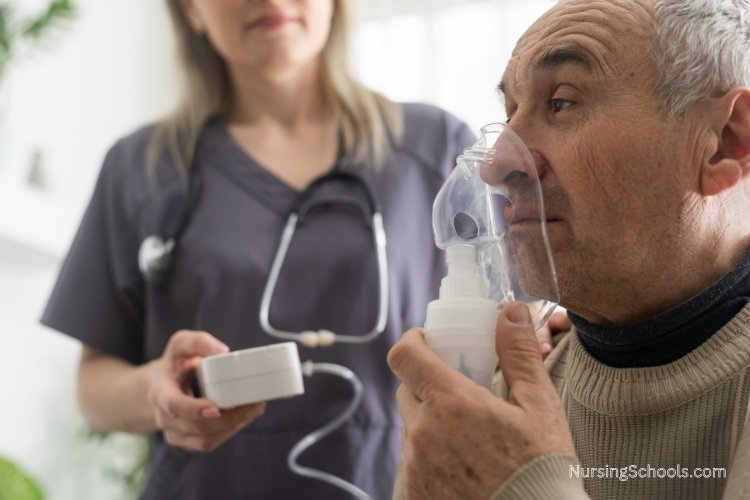Respiratory Nurse
Nursing Career Guide

When patients struggle to breathe, Respiratory Nurses provide the specialized care needed to support lung function and overall respiratory health. These nurses assist with conditions like asthma, COPD, pneumonia, and post-surgical breathing complications, often managing oxygen therapy and ventilator support. They collaborate with pulmonologists and respiratory therapists in hospitals, intensive care units, and outpatient clinics. Let's delve into the Respiratory Nurse specialty and explore what it takes to thrive in this critical care-focused career in nursing.
Overview
What Is a Respiratory Nurse?
A Respiratory Nurse specializes in caring for patients with acute and chronic respiratory conditions, such as asthma, chronic obstructive pulmonary disease (COPD), pneumonia, and lung infections. These nurses assist with oxygen therapy, mechanical ventilation, and patient education to improve lung function and quality of life.
Respiratory Nurses work in hospitals, pulmonary rehabilitation centers, home healthcare settings, and intensive care units (ICUs). They collaborate with pulmonologists, respiratory therapists, and other healthcare providers to monitor respiratory conditions and provide life-saving interventions.
This career requires expertise in respiratory assessment, critical care, and patient education to manage and treat breathing disorders effectively.
Education
How To Become a Respiratory Nurse
Becoming a Respiratory Nurse requires a combination of traditional nursing education, clinical experience, certification, and specialized training in pulmonary care and respiratory disease management. Follow these steps to enter this challenging and rewarding healthcare career:
- Earn a Nursing Degree. Complete an Associate of Science in Nursing (ASN) or Bachelor of Science in Nursing (BSN). A BSN is preferred for advanced respiratory nursing roles.
- Pass the NCLEX-RN. Obtain your nursing license by passing the National Council Licensure Examination for Registered Nurses (NCLEX-RN).
- Gain Clinical Experience. Work as a Registered Nurse (RN) in pulmonary units, ICUs, or outpatient respiratory clinics.
- Obtain Respiratory Nursing Certification. Earn the Critical-Care Registered Nurse (CCRN) credential through the American Association of Critical-Care Nurses (AACN) or obtain the Certified Pulmonary Function Technologist (CPFT) certification.
- Continue Professional Development. Stay updated with advancements in respiratory care, ventilator management, and patient rehabilitation through continuing education courses and workshops.
On average, it takes 4-6 years to become a Respiratory Nurse, including nursing school, licensure, and obtaining specialized training. Certifications enhance job opportunities and credibility in this field.

Average Salary
How Much Does a Respiratory Nurse Make?
Salaries for Respiratory Nurses vary based on experience, location, and work setting. On average, a Respiratory Nurse can expect to earn between $80,000 and $110,000 annually.
Average annual salary for a Respiratory Nurse:
- Entry-level: $80,000 - $90,000 per year.
- Mid-career: $90,000 - $100,000 per year.
- Experienced: $100,000 - $110,000 per year.
The U.S. Department of Labor reports that Respiratory Nurses earn an average hourly wage of approximately $42.00 per hour. Assuming a 40-hour workweek, this equates to an annual salary of $87,360. The lowest 10% earn less than $36.00 per hour, while the highest 10% earn more than $50.00 per hour, resulting in an annual salary range of $74,880 to $104,000 per year.
Job Duties
What Does a Respiratory Nurse Do?
Respiratory Nurses provide specialized care to patients experiencing respiratory distress and chronic lung diseases. Their role includes airway management, administering treatments, and patient education.
The most common job duties of a Respiratory Nurse:
- Assessing Respiratory Conditions. Perform lung function tests, monitor oxygen saturation, and evaluate symptoms.
- Administering Breathing Treatments. Provide nebulizer therapy, inhalers, and oxygen therapy as prescribed.
- Managing Mechanical Ventilation. Assist patients on ventilators, monitor settings, and ensure airway patency.
- Educating Patients on Lung Health. Teach patients self-care techniques, smoking cessation, and pulmonary rehabilitation strategies.
- Monitoring for Respiratory Complications. Identify and respond to respiratory distress, infections, and worsening lung conditions.
- Providing Emergency Airway Support. Assist in intubation, tracheostomy care, and rapid response interventions.
- Collaborating with Pulmonologists. Work closely with respiratory therapists and physicians to optimize treatment plans.
- Advanced Duties. Experienced Respiratory Nurses may specialize in neonatal care, home ventilation management, or critical care respiratory nursing.
Respiratory Nurses typically work in hospitals, intensive care units, pulmonary clinics, rehabilitation centers, and home healthcare settings. Their role is crucial in managing chronic lung conditions and assisting patients in respiratory recovery.

Essential Skills
What Skills Does a Respiratory Nurse Need?
Respiratory Nurses require a combination of clinical expertise, patient education abilities, and quick decision-making skills. These skills enable them to provide effective care for patients with breathing difficulties.
Here are some of the skills a Respiratory Nurse needs to succeed:
- Respiratory Assessment. Evaluate lung function, detect respiratory distress, and determine treatment needs.
- Ventilator Management. Assist with mechanical ventilation and adjust settings based on patient needs.
- Oxygen Therapy Administration. Provide and adjust supplemental oxygen therapy for patients with chronic lung diseases.
- Critical Thinking. Quickly assess and intervene in cases of respiratory failure or distress.
- Patient Education. Teach patients how to manage respiratory conditions and use assistive breathing devices.
- Emergency Response. Recognize and respond to respiratory emergencies such as asthma attacks or pulmonary embolisms.
- Collaboration. Work with pulmonologists, respiratory therapists, and rehabilitation nursing teams to develop comprehensive treatment plans.
- Compassion. Provide emotional support to patients struggling with chronic breathing difficulties.
One of the biggest challenges of being a Respiratory Nurse is managing patients with progressive respiratory diseases that have no cure. However, the role is highly rewarding, as it allows nurses to improve patients' lung function and enhance their quality of life.
Last updated: August 28, 2025
References:
- Registered Nurses. Bureau of Labor Statistics, U.S. Department of Labor. Occupational Outlook Handbook. Retrieved August 28, 2025.
- NCLEX Nurse Licensure Exam. National Council of State Boards of Nursing (NCSBN). Retrieved August 28, 2025.
- Respiratory Nurse. Johnson & Johnson, Nursing Careers. Retrieved August 28, 2025.
- Respiratory Nurse Salary in the United States. ZipRecruiter, Healthcare Career Path. Retrieved August 28, 2025.
- Advance the respiratory care profession. American Association for Respiratory Care (AARC). Retrieved August 28, 2025.
- We help the world breathe. American Thoracic Society (ATS). Retrieved August 28, 2025.
- Critical-Care Nursing Certification (CCRN). American Association of Critical-Care Nurses (AACN). Retrieved August 28, 2025.
- Certified Pulmonary Function Technologist (CPFT). The National Board for Respiratory Care (NBRC). Retrieved August 28, 2025.
- How Do I Become a Respiratory Nurse. Western Governors University (WGU), Healthcare Career Guides. Retrieved August 28, 2025.
- How to Decide Between Registered Nurse and Respiratory Therapist. Concorde Career Colleges, Career Insights. Retrieved August 28, 2025.


